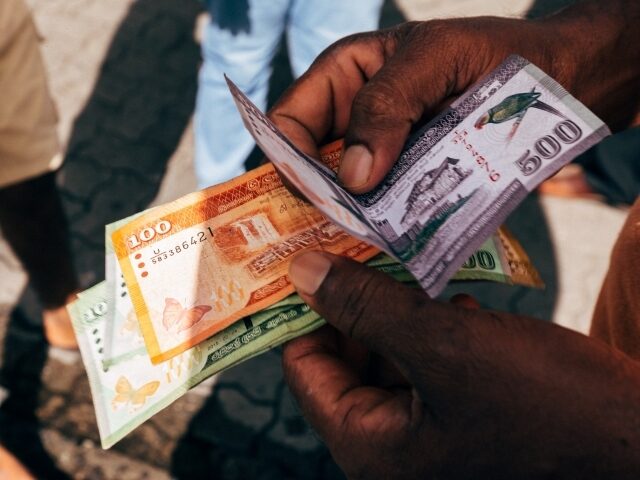The Democratic Socialist Republic of Sri Lanka is hoping to take out yet another billion-dollar loan, open a separate $1.5 billion credit line, and activate a $1.5 billion currency swap with communist China, Sri Lanka’s envoy to Beijing told Bloomberg News on Friday.
Sri Lanka – a socialist oligarchy ruled by the Rajapaksa dynasty for decades before the last family member in office, Gotabaya Rajapaksa, gave up the presidency on Friday – is currently facing the worst economic crisis in its history, the result of Rajapaksa family mismanagement directly tied to a proclivity for taking out predatory Chinese loans. Under Gotabaya and his brother, former president and prime minister Mahinda Rajapaksa, Sri Lanka signed onto China’s Belt and Road Initiative (BRI) and took out loans too big to repay for projects it could not maintain, making it one of the world’s biggest BRI losers.
Under Gotabaya Rajapaksa, Sri Lanka ran out of foreign currency reserves this year, resulting in bankruptcy and widespread shortages of nearly every basic good in the country, most distressingly food, medicine, and fuel. Rajapaksa had also made the country dependent on imports of food after banning chemical fertilizers, a “green” initiative to go all-organic that the former president admitted in April was a “mistake.”
The small Asian island nation has made international headlines for months as the economic crisis has fueled a popular uprising equal parts civil and violent. On the one hand, mobs of angry Sri Lankans burned down over 50 private homes belonging to politicians – at least two prime ministers, Mahinda Rajapaksa in May and Ranil Wickremesinghe last week. In contrast, last week, throngs of what appeared to be hundreds of people occupied the president and prime minister’s historic residences to throw a massive party, eat the luxurious food, drink the president’s alcohol, and, bizarrely, use the president’s soap to shower. The party ended peacefully on Thursday when protesters decided that, as Gotabaya Rajapaksa had fled the country, they had made their point. Some stayed behind to clean up.
As of Friday, Sri Lankans continue to take the streets in celebration of Rajapaksa fleeing the country.
大批斯里兰卡民众星期五(7月15日)聚集在首都科伦坡的总统府外面,庆祝该国总统辞职。当天稍早,斯里兰卡议长阿贝瓦德纳宣布,总统戈塔巴雅·拉贾帕克萨辞去了总统职务。近年来,主权债务危机导致斯里兰卡经济陷于瘫痪。科伦坡7月9日爆发大规模抗议活动。 pic.twitter.com/KCWHBwJ61r
— 美国之音中文网 (@VOAChinese) July 15, 2022
Gotabaya Rajapaksa’s departure to the Maldives, and later to Singapore, resulted in Prime Minister Wickremesinghe becoming interim president. The nation’s parliament will choose a new president on July 20.
In the meantime, the Wickremesinghe government appears determined to repeat Rajapaksa’s mistakes, seeking outlandish loans from China to pay off previous outlandish loans from China. Sri Lankan Ambassador to Beijing Palitha Kohona told Bloomberg on Friday that Colombo is seeking $4 billion in aid from the Communist Party in addition to several new billion-dollar commitments.
“We are confident that at some point the Chinese system will agree to our requests because these are not unreasonable requests,” Kohona told Bloomberg. “We have made similar requests to other creditors. Sri Lanka needs the funding to bring stability to our financial system and we are confident that the Chinese will come to the party sooner than later.”
One of the loans requested is reportedly a billion-dollar loan to avoid defaulting on a separate Chinese loan. About ten percent of Sri Lanka’s prodigious debt belongs to China.
“Sri Lanka’s federal government has about US$12.6 billion in outstanding bonds owed to global funds; all repayments are frozen and defaults have been recorded,” Bloomberg explained. “It owes roughly an equivalent amount to bilateral creditors and multilateral lenders.”
The publication of Kohona’s remarks followed reports that the International Monetary Fund (IMF) sought to continue talks with Sri Lanka after Rajapaksa’s departure.
“We hope for a resolution of the current situation that would allow for our resumption of a dialogue on an IMF-supported program,” IMF spokesman Gerry Rice said on Thursday, according to the Sri Lankan news outlet Ada Derana. Currently, Rice indicated, such conversations could not occur as Sri Lanka did not have a stable government, but the IMF hoped for them to resume “as soon as possible.”
Those conversations may be more favorable under Wickremesinghe – should he win the parliament’s presidential election – than under Rajapaksa. Wickremesinghe served as prime minister under Gotabaya Rajapaksa but had been a rival of the family’s as recently as 2018, when then-President Maithripala Sirisena attempted to illegally depose Wickremesinghe as prime minister to install Mahinda Rajapaksa. Last month, Wickremesinghe appeared to condemn China, frustratedly insisting he was “trying to have a dialogue” with the communist regime, for impoverishing Sri Lanka through the unsustainable borrowing the Rajapaksa’s had spearheaded.
Rajapaksa claimed to attempt a dialogue with China to exit its BRI debt trap in January, but Beijing failed to work with Colombo for any significant debt restructuring.
The Chinese Communist Party has enthusiastically rejected any blame for the situation in Sri Lanka, relying on its propaganda arms to make the case that the massive BRI debt has nothing to do with the collapse of the nation’s economy.
“Western countries’ commercial creditors and multilateral financial institutions are responsible for Sri Lanka’s foreign debt,” the Chinese regime-run Global Times newspaper boldly concluded last week. “Many research reports have repeatedly demonstrated that Sri Lanka’s current debt crisis is not directly related to Chinese-funded infrastructure investment.”

COMMENTS
Please let us know if you're having issues with commenting.